2023 Nancy & Bill Norton Education Series (NES): The Gut Microbiome
Its Overall Health and Related Illnesses
Watch Now
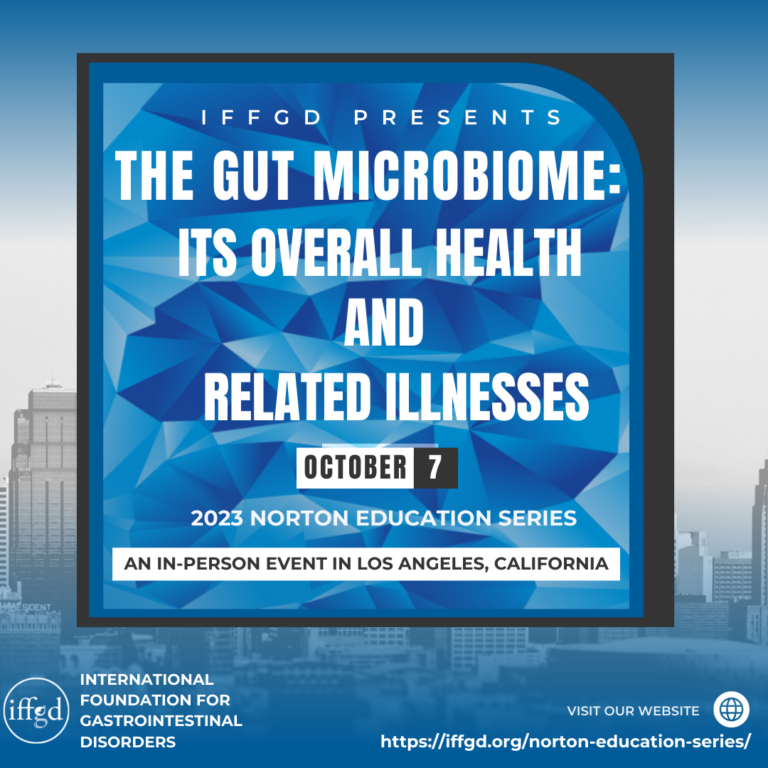
Program Committee Chair: Dr. Ali Rezaie
In collaboration with: healthcare providers from Cedars-Sinai Medical Center of Los Angeles
Date: October 7th, 2023
Meeting Location: Beverly Hills Marriott, 1150 S Beverly Dr, Los Angeles, CA 90035
This page is updated regularly. Check back daily for the latest information.
Program Overview
For individuals suffering from chronic illnesses, including chronic GI conditions, management interventions play an important role in reducing health care utilization and improving long-term health outcomes for patients. These interventions may include patient education, support for decision-making, self-monitoring of symptoms, adhering to treatment regimens, psychological and social support, and maintaining difficult lifestyle changes.
In collaboration with Cedars-Sinai Medical Center of Los Angeles, IFFGD hosted a complimentary edition of the NES program dedicated to Gut Microbiome – its overall health and related illnesses. Dr. Ali Rezaie from Cedars-Sinai Medical Center of Los Angeles was Program Committee Chair. Dr. Rezaie and Ceciel Rooker, IFFGD President, hosted the event in Los Angeles, CA.
The NES: Gut Microbiome: its overall health and related illnesses was a full-day event complimentary to the public, patients and caregivers that included topics relating to multiple aspects of the gut microbiome. This included information from medical professionals on daily experiences and management techniques that patients can use to improve their day-to-day living. There was also a post-event reception for all attendees to network, share stories, and resources.
Health and Safety
We will closely monitor the CDC regulations in regards to COVID19. We will implement requirements based on the CDC and the event location guidelines during this event. We will keep all registrants informed about these requirements and protocols that we implement for the in-person NES event. Please do not hesitate to contact our staff at iffgd@iffgd.org with any questions and/or concerns.
Note: To allow for social distancing and quality interaction between presenters and attendees, seating is limited to the first 50 registrants.
Program Agenda
| Time | Title | Presenter |
|---|---|---|
| 8:30-10:00 AM | Breakfast | |
| 10:15-11:00 | From gum to bum: How does your digestive system work? | Ali Rezaie |
| 11:00-11:30 | Gut microbiome: What is it and where do we stand? | Ruchi Mathur |
| 11:30-12:00 | Assessing the microbiome | Gabriela Leite |
| 12:00-1:00 | LUNCH | |
| 1:00-1:30 | Post infectious IBS: Road to cure | Mark Pimentel |
| 1:30-2:00 | Small intestinal bacterial overgrowth (SIBO): Diagnosis and treatment | Jason Nasser |
| 2:00-2:20 | Helicobacter pylori: Diagnosis and treatment | Yin Chan |
| 2:20-2:40 | Clostridioides difficile infection: Diagnosis and treatment | Amrit Kamboj |
| 2:40-3:00 | Intestinal methanogen overgrowth: New tricks for an old relic! | Coka Yip |
| 3:00-3:30 | Q&A and closing remarks |
Program and Presenter Details

Presentation Overview:
During this presentation, Dr. Rezaie provided an overview of the anatomy and function of each segment of the gastrointestinal tract as well as how they relate to diagnosis and treatment of various diseases.

This talk introduced the concept of the human microbiome, with a focus on the gut. Dr. Mathur explored the intricate relationship between the human host and its microbiome in daily life, as well as in health and disease. A historical perspective was provided as well as recent data – with a focus on the small intestinal microbiome- an area of new and exciting research.
Dr. Mathur is an academic Endocrinologist, with a specific interest in the relationship between the GI tract and the Endocrine system. Early projects focused on gastric myoelectrical activity and glycemic control. This was the basis for an Endocrine Fellows Foundation Grant, and an ADA grant early in her Fellowship. As her career in clinical Endocrinology has expanded to include a focus on polycystic ovary syndrome (PCOS), pre-diabetes, diabetes and obesity, the relationship between metabolic disease and the GI tract has been a growing research fascination. In collaboration with researchers in the Division of Gastroenterology, they published the first paper confirming a clinical association with PCOS and irritable bowel syndrome (IBS), in which noted an increase in body mass index (BMI) in women with IBS.
Since then, her research has focused on exploring the roles of the gut microbiome in human health and disease, including metabolic conditions such as obesity and diabetes. They found that individuals with methane on breath test (a surrogate for gastrointestinal colonization with methanogens) have higher BMIs and percent body fat, both in already obese individuals, and in the general population, and demonstrated that this is largely due to gastrointestinal colonization with methanogenic Archaea, specifically Methanobrevibacter smithii. Building on this, Dr. Mathur and her team treated obese pre-diabetic, methane-positive subjects with specific antibiotics that can target Archaea, which resulted in significant improvements in low-density lipoprotein (LDL) and total cholesterol levels, as well as significantly lower blood insulin levels and lower blood glucose levels on OGTT.
In addition, as part of her role as Clinical Director for the Medically Associated Science and Technology (MAST) program, she has explored the roles of small bowel microbiota in human health and disease through the novel REIMAGINE (Revealing the Entire Intestinal Microbiota and its Associations with the Genetic, Immunologic, and Neuroendocrine Ecosystem) study, in which small bowel aspirates are obtained from patients undergoing standard-of-care endoscopies without colon prep. Samples are collected using novel, validated techniques designed to prevent contamination from saliva and the stomach, and maximize recovery of DNA from small intestinal microbiota, including a novel double-lumen catheter. Through this study, she and her team have identified alterations in small bowel microbial populations associated with ageing, smoking, and the use of hormone therapy in post-menopausal women. Most recently, this work identified 4 specific Escherichia coli and Klebsiella species and strains that together account for over 40% of duodenal bacteria in patients with small intestinal bacterial overgrowth (SIBO), and correlate with the severities of abdominal pain, bloating, and diarrhea. They have also continued to explore the potential contribution of androgen production by gut microbes to the elevated hormone levels seen in PCOS, for which we are currently testing a candidate microbe in a rat model, and are also exploring the roles of small intestinal microbes in type 2 diabetes and obesity.
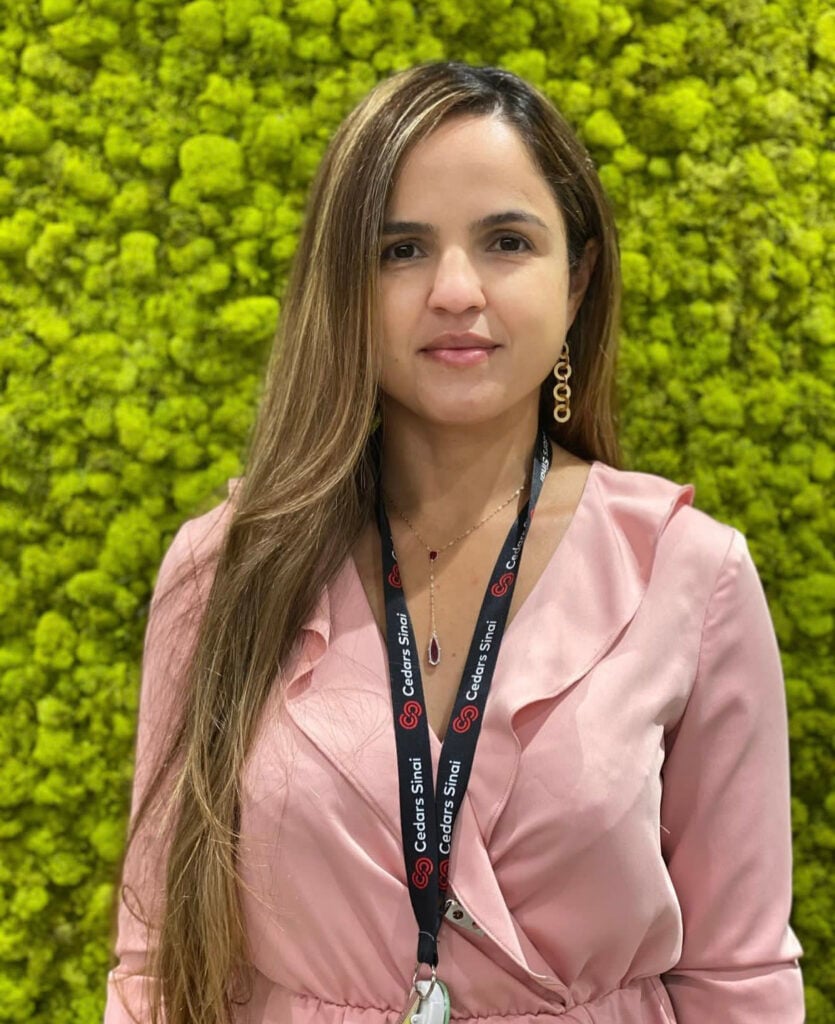
Presentation Overview:
Studies of the gut microbiome have yielded critical insights as to the influences of commensal microbes on human health, including influences on the immune system and on nutrient digestion, absorption and metabolism. However, most studies to date have been performed using stool samples, which are not representative of the metabolically active small bowel. Therefore, the objective of this presentation was to show the importance of the small bowel microbiome and its association with Small Intestinal Bacterial Overgrowth and Irritable Bowel Syndrome.
Gabriela Leite, PhD, is the Leader Scientist for the Medically Associated Science and Technology (MAST) Program at Cedars-Sinai Medical Center. She has over ten years of experience as a researcher in the field of molecular biology, with a specific interest in the relationships between microbes – as single microorganisms or in collections (microbiomes) – and their hosts, particularly in humans. Dr. Leite obtained her B.Sc. and M.S. from Maringa State University in Brazil, where she majored in Pharmacy and Clinical Analysis and earned her master’s degree in Health Sciences. Afterward, Dr. Leite earned her PhD in Science from the University of Sao Paulo in Brazil. Before joining the MAST Program, she was a postdoctoral researcher in the University of Sao Paulo’s Department of Clinical Analysis. Her research interests include the interrelationship between the gut microbiome and gastrointestinal conditions, such as Irritable Bowel Syndrome and Small Intestinal Bacterial Overgrowth. She has published several articles and abstracts on these subjects and has lectured both nationally and internationally in these areas.
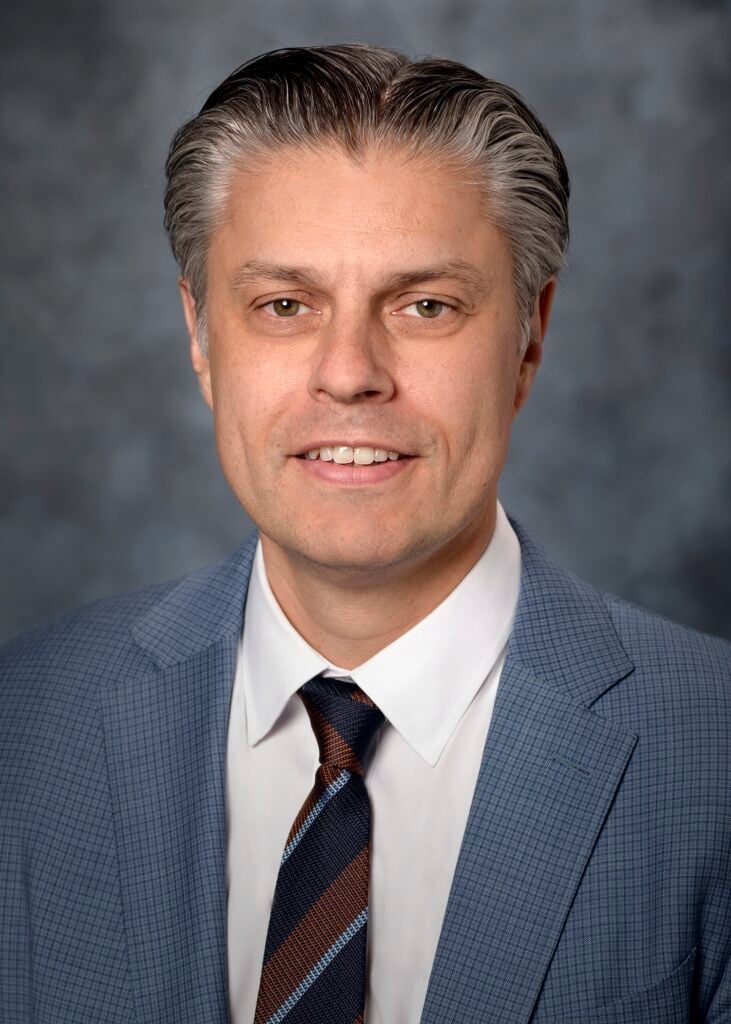
Presentation Overview
While post-infectious IBS, as an entity, has been known for over 30 years, recent data suggest that there is more to the story. We now know that this initial infection causes an autoimmune event linked to changes in gut motility which ultimately cause changes in the intestinal microbiome. The combination of these events leads to the symptoms of IBS including bloating, diarrhea and pain. It is now know that this could account for up to 60% of IBS-D. But, moreover, these findings set up a path for the development of new treatments.
Mark Pimentel, MD, FRCP(C), is a Professor of Medicine at Cedars-Sinai and Professor of Medicine and of Gastroenterology through Geffen School of Medicine. Dr. Pimentel is also the Executive Director of the Medically Associated Science and Technology (MAST) program at Cedars-Sinai, an enterprise of physicians and researchers dedicated to the study of the gut microbiome in order to develop effective diagnostic tools and therapies to improve patient care. As a physician and researcher, Dr. Pimentel has served as a principal investigator or co-investigator for numerous basic science, translational and clinical investigations of irritable bowel syndrome (IBS) and the relationship between gut flora composition and human disease. This research led to the first ever blood tests for IBS, ibs-smart™, the only licensed and patented serologic diagnostic for irritable bowel syndrome. The test measures the levels of two validated IBS biomarkers, anti-CdtB and anti-vinculin. A pioneering expert in IBS, Dr. Pimentel’s work has been published in the New England Journal of Medicine, Annals of Internal Medicine, American Journal of Physiology, American Journal of Medicine, American Journal of Gastroenterology and Digestive Diseases and Sciences, among others. Dr. Pimentel has presented at national and international medical conferences and advisory boards. He is a diplomate of the American Board of Internal Medicine (Gastroenterology,) a fellow of the Royal College of Physicians and Surgeons of Canada and a member of the American Gastroenterological Association, the American College of Gastroenterology, and the American Neurogastroenterology and Motility Society. Dr. Pimentel completed 3 years of an undergraduate degree in honors microbiology and biochemistry at the University of Manitoba, Canada. This was followed by his medical degree, and his BSc (Med) from the University of Manitoba Health Sciences Center in Winnipeg, Manitoba, Canada, where he also completed a residency in internal medicine. His medical training includes a fellowship in gastroenterology at the UCLA Affiliated Training Program.
1. Identified the antibiotic rifaximin as an effective treatment for irritable bowel syndrome (IBS.)
2. Developed the first blood test for IBS having identified a link between the disease and episodes of acute gastroenteritis (food poisoning.) The second generation of the test provides increased specificity and accuracy enabling physicians to diagnose diarrhea predominant and mixed-type irritable bowel syndrome (IBS-D and IBS-M.)
3. Described the association between IBS and bacterial overgrowth which forms the basis for microbiome therapies for small intestinal bacterial overgrowth or SIBO.
4. Identified the role of methanogen (Methanobrevibacter smithii) in the development of constipation
5. Developed a novel breath testing system to measure all three fermenting gases from the gut microbiome on human breath.
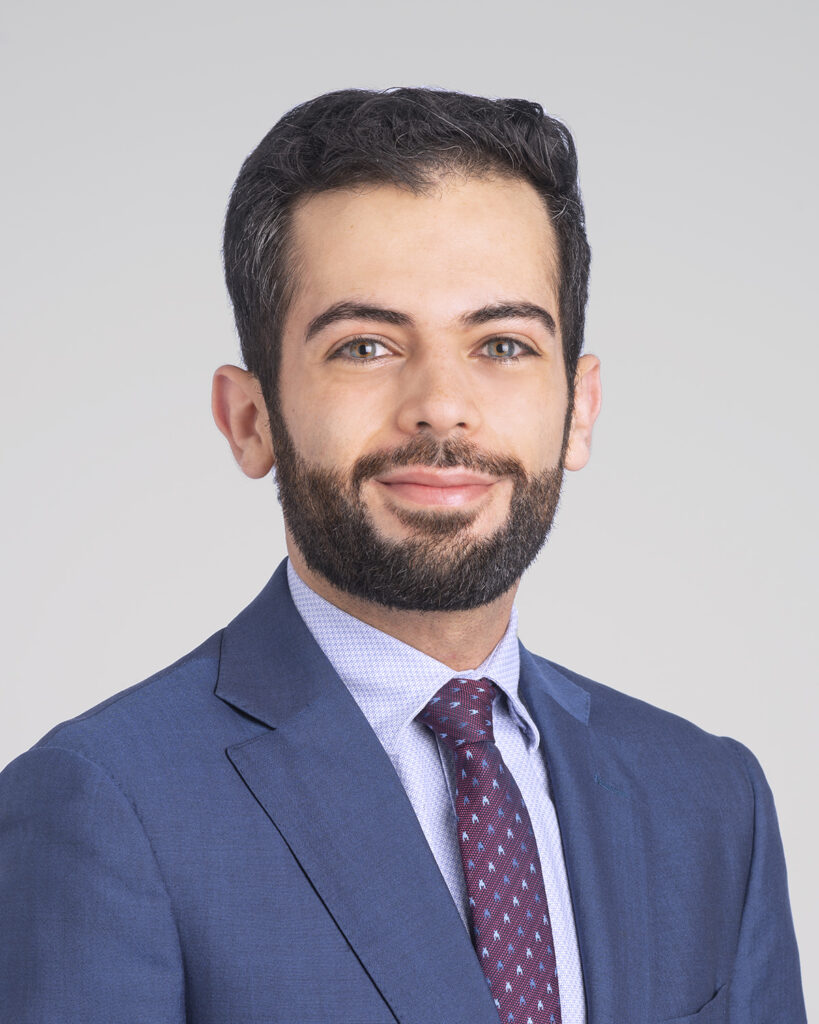
Presentation Overview:
SIBO is a common condition that causes symptoms like bloating, abdominal pain, diarrhea, and even malnutrition. The human body contains trillions of microbes that live with us in harmony. Normally, our small intestine has few microbes relative to the large intestine. In small intestinal bacterial overgrowth, or SIBO, the delicate balance is disrupted by a disproportionate overgrowth of certain bacteria in the small intestine. In this talk, we discussed what we can do to know if someone has SIBO as well as what treatment options can be offered to resolve it.
Dr Nasser is a gastrointestinal motility fellow at Cedars-Sinai. His clinical and research interests include exploring the role of the microbiome in motility disease phenotypes, the interface between IBS and enteropathies, and identifying applications for artificial intelligence in gastroenterology.

Helicobacter pylori (H. pylori) is a bacteria that is commonly found in the stomach of at least one-half of the world’s population.
While most individuals infected with H. pylori will not experience any signs or symptoms, a subset of infected individual will develop digestive issues for reasons yet unknown.
This presentation focused on common symptoms related H. pylori and when and how you should be tested. We will also discussion current FDA approved treatments.
Dr. Yin Chan is a Staff Physician in the GI Motility program at the Cedars-Sinai Medical Center in Los Angeles. He received his MD/PhD from the University of Toronto, before completing a General Gastroenterology fellowship at the University of Calgary and ultimately a GI Motility fellowship at the Cedars-Sinai Medical Center. His primary research interest is the interaction between immune system and gut-brain-microbiome axis in Functional GI Disorders.

Presentation Overview:
Clostridioides difficile (C. difficile) infection is one of the most common gastrointestinal infections and presents with variable symptoms ranging from mild watery diarrhea to severe, life-threatening inflammation of the colon. The objective of this presentation is to discuss the diagnosis and management of C. difficile infection. We reviewed the risk factors for this condition, common presenting symptoms, testing options available for diagnosis, and various treatment options including antibiotic therapy and the role of fecal transplant. In addition, we shared strategies for prevention to decrease risk of developing repeated episodes of this infection and its spread to others.
Dr. Kamboj is a gastroenterologist at the Cedars Sinai Digestive Diseases Center and a member of the Gastrointestinal Motility Program and Esophageal Disorders Center. He completed his gastroenterology and hepatology fellowship and advanced esophageal fellowship both at the Mayo Clinic in Rochester, Minnesota. Dr. Kamboj has a variety of clinical and research pursuits related to esophageal and gastrointestinal disorders including Barrett’s esophagus, eosinophilic esophagitis, gastroesophageal reflux disease, and esophageal motility disorders, among others. He has published more than 100 articles and abstracts to date and has frequently lectured at regional, national, and international conferences.
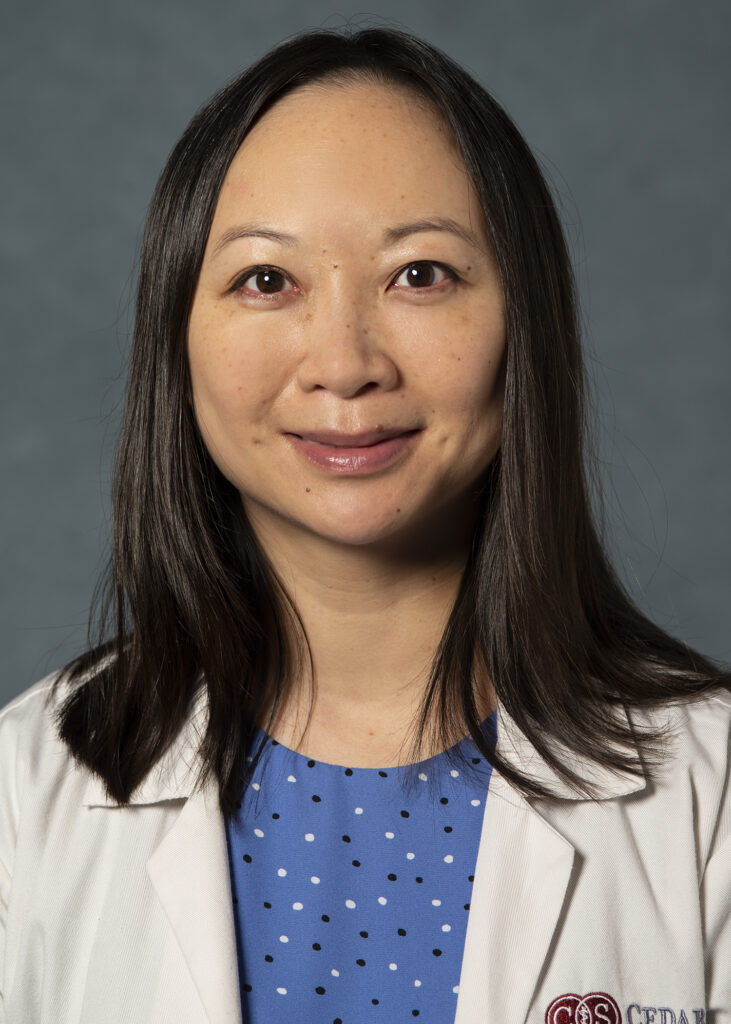
Presentation Overview
The focus of this presentation was Intestinal Methanogen Overgrowth (IMO), which is a condition that affects the digestive system. Methanogens are microorganisms (archaea) that produce methane and IMO is caused by an overgrowth of this archaea in the intestines. We will learn about the symptoms, such as bloating and gas, and how it can affect digestion. During this presentation we discussed dietary and lifestyle changes that can help manage IMO and promote a healthier gut. By understanding and addressing this condition, we can improve our digestive health and overall well-being for those living with this condition.
Dr. Coka Yip received her Master of Science in Nursing in 2007 and has been a GI nurse practitioner (NP) for 16 years. She was a general GI NP for four years before sub-specialized in inflammatory bowel disease (IBD) at Stanford Health Care. Coka was recruited to Singapore and was part of the IBD team at the National University Hospital of Singapore for three years before she joined the GI Motility team at Cedars-Sinai Medical Center in 2018. She graduated with a Doctor of Nursing from the Southern California CSU DNP Consortium in 2020. In addition to her clinical practice, she participates in nursing research, leads quality improvement projects, and precepts NP students.
IFFGD Hosted: Patient Networking and Social Hour
An opportunity for patients and guests to socialize, get to know each other, share stories, and resources.














